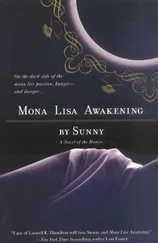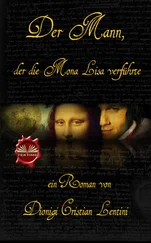Tomorrow at sext, go unaccompanied to ask God for the answer.
For centuries, the faithful had divided the day into hours of prayer: The most familiar were matins, at dawn, and vespers, in the evening. After dawn, there came the third hour of the morning, terce, and the sixth hour, sext, at midday.
I stared at the writing, at the perfectly vertical letters, with the long, flourished f ’s and l ’s, the squat n ’s, the careless spelling. I had seen it only twice before in my life, but I recognized it at once.
Greetings, Madonna Lisa, from Milan…
F or the remainder of the night I did not sleep, but lay in my bed pondering the letter. Go pray, it had said. Unaccompanied. Surely this meant I should leave the palazzo; but there were easily a hundred churches in Florence. Where had he meant for me to go?
In the end, I decided only one place was logical: Santissima Annunziata, our family chapel, where I could easily go to pray at matins or sext without arousing suspicion, where I had last encountered the Devil.
In the morning, I rose without saying anything to Zalumma, but she sensed my agitation and asked me what was troubling me. When I told her of my intention to pray-alone-she scowled. I rarely went anywhere without her.
“This has to do with the letter,” she said. Her words gave me a start, until I realized she was referring to the letter the devilish young intruder had dropped, the one I had told her about. “I know you don’t mean to frighten me, Madonna, but I can’t help worrying. I would not like to think you are becoming involved in dangerous matters.”
“I would never be so foolish,” I said, but even I heard the uncertainty in my tone.
She shook her head. “Go alone, then,” she said darkly, pressing against the limits of what a slave might say to a mistress. “Just remember that you have a child.”
My answer held a trace of heat. “I would never forget.”
The driver took me to Santissima Annunziata. I directed him to wait in the open square in front of the church, across from the graceful colonnades of the Foundling Hospital. Just as the bells began to call the faithful, I stepped over the threshold of the narthex, passed the monks and worshipers moving into the sanctuary, and made my way to our little chapel.
The room was empty, which both disappointed and relieved me. No priest awaited; the candles were unlit, the air unclouded by incense. I had made no arrangements, had told no one save Zalumma and the driver of my coming. Uncertain, I went to the altar and knelt. For the next few minutes, I calmed myself by reciting the rosary. When I at last heard light, quick footsteps behind me, I turned.
The Devil stood smiling, in his guise as Servite monk. His cowl covered his head; his hands held folds of black fabric.
“Monna Lisa,” he said. “Will you come with me?” He was trying to play the role, to be polite and circumspect, but he could not entirely mask the slyness in his voice, his eyes.
In answer, I rose. As I approached him, he proffered the black fabric; the folds came loose, revealing a cloak.
“This is silly,” I said, more to myself than to him.
“Not at all,” he replied, and held the cloak open for me, his gaze darting all the while at the chapel door. “It will make sense shortly.”
I let him drape the cloak over me, let him raise the cowl and pull it forward so that my cap and veil were covered, my face obscured. The black cotton hung low, trailing on the floor so that it hid my skirts.
“Come,” he said.
He led me back out onto the street, a safe distance from where my carriage waited; the plaza was busy, filled with men and children and vendors, so that no one noticed two friars. He steered me to a rickety wagon tied to a post and harnessed to an aging, swaybacked horse.
“Let me help you up.” He gestured for me to climb into the seat.
“No.” I realized suddenly that this young man had been capable of breaking into my house like a thief. How could I be certain that he did not mean to abduct and question me about my husband’s secret activities?
He raised his hands in a show of disgusted innocence. “Then don’t come. Go back to your pretty palace. Close your eyes.”
He meant what he said; he had taken a step away from me. If I wanted, I could leave him and go back into the chapel. I could walk across the piazza to my driver. “Help me up,” I said.
He did so, then untied the reins and climbed up beside me. “A few precautions first.” He reached for a bit of cloth on the seat between us. Quickly, deftly, he shook out the folds and reached inside my raised hood. His fingers, so fast and nimble, teased the fabric around my eyes, around the back of my head, and tied it before I understood what he was doing.
I was blindfolded. Panicked, I raised my hands.
He clicked his tongue as if he were soothing an animal. “Hush. No harm will come. This is for your safety, not mine.” I shuddered at the feel of something soft brushing against my cheek and pulled back again at the sensation of it being stuffed into my ears. All sound was dulled-the noise of the crowd in the plaza became an unintelligible thrum-but I could hear the Devil speaking, no doubt loudly for my sake.
“It’s all right. We’ll be there soon…”
The cart jerked and began to move; I swayed and held the edge of the seat to keep my balance. We rode for several minutes. I did my best to listen to where we were going, but I understood why I had been summoned precisely at midday. All the church bells had already sounded; there were none singing-each in its own peculiar voice-to indicate what part of the city we were in.
At last the wagon rolled to a stop. The young Devil’s voice instructed me to turn to the right. I heard movement, felt hands reaching for me; with their help, I climbed blindly from the wagon. He took my elbow, and urged me to move quickly, just short of a run; I lifted my skirts, fearful of tripping. Even with the unspun wool in my ears, even without sight, I sensed the change as we moved from the sunwarmed air inside, where the air was closer and cool.
Fingers gripped my arm, forced me to stop; my guide gave a low whistle. A pause, then the sound of a different whisper, low and muffled, unintelligible through the wool. A warm body stood before me, then turned. The Devil and I followed. We walked a short pace, then climbed a flight of stairs. I was made again to stop, and listened to the groan of heavy wood sliding against stone, as if a wall were being pushed aside. A faint breeze stirred as a door opened.
I was led at a more leisurely pace for a moment, over a floor gritty from a dusting of sand. I had passed by enough artists’ botteghe to recognize the pungent smells of boiling linseed oil and caustic lime. I was pressed to sit upon a low-backed chair. In a smug, cheery tone, the Devil addressed a third party, loud enough so that I could clearly distinguish each word.
“Ask and you shall receive.”
“Will you bring what I asked for?”
“If I must. After that, how long do I have to myself?”
“Give us no more than half an hour, to be safe.” The voice was masculine, soft. “Make sure we don’t run over the time.”
At the sound of the voice, I reached for the blindfold and pulled it up and off my head.
The Devil was already gone, his steps sounding in the corridor. The man standing over me, reaching for the piece of cloth at the same time I removed it, was clean-shaven, with softly waving shoulder-length hair streaked brown and iron, parted in the middle. He, too, wore the habit of a Servant of Mary.
For an instant, I failed to recognize him. Without the beard, his chin appeared sharply, unexpectedly pointed, his cheekbones and jaw more angular; the stubble that glinted in the diffused light was now mostly silver. He was still handsome; had his features been any more perfect-the eyes less deep-set, the bridge of the nose less prominent, the upper lip less stingy-he would have been merely pretty. Leonardo smiled gently at my confusion, which made the creases in the corners of his light gray eyes more noticeable.
Читать дальше
Конец ознакомительного отрывка
Купить книгу












